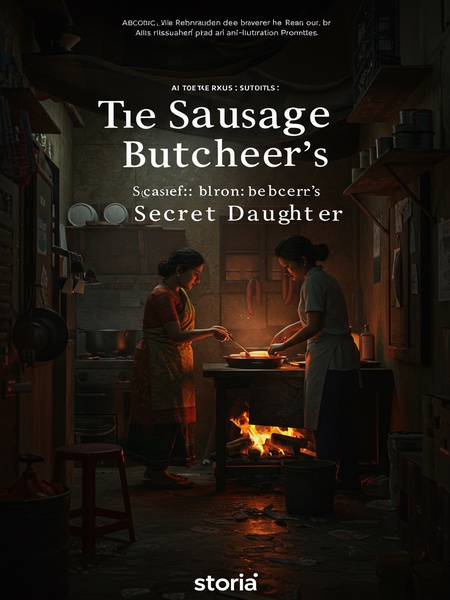Chapter 3: Shadows in the Family
3
I was baffled.
For a long time, I sat at my desk, staring at the blank case file, tapping my pen in frustration. The faint aroma of incense drifted in from the station’s tiny temple, but even that offered no comfort.
Logic told me Prakash was unlikely to lie; he had shown almost no signs of deception during questioning.
I replayed the interview in my mind. Prakash’s face, impassive yet strangely sincere, refused to leave my thoughts. Years of experience told me: this wasn’t a man inventing stories to save himself.
So why would the Sharmas lie? Even if they had wronged Prakash somehow, they were the victims now—the law wouldn’t hold it against them.
Unless, I thought grimly, there was a secret so dark, even justice felt like too small a price to pay. I scribbled a question mark in the margin of my notes, pressing the pen so hard it tore the page.
I realised this case might not be as simple as murder and dismemberment.
My instincts prickled. No case with this much pain and silence was ever straightforward. Something was festering beneath the surface, something ugly and hidden.
The Sharmas weren’t suspects. If they didn’t want to tell the truth, there was nothing I could do except hope my colleagues would find new clues.
I sighed, rubbing my temples. There are limits even to police power; sometimes, all you can do is wait for the truth to slip through the cracks.
About two hours later, my colleague called. He said Prakash’s butcher shop was covered in mutton, beef, and chicken blood. Finding Ananya’s blood would be nearly impossible.
He sounded exhausted, voice cracking over the phone. “Yaar, the place smells like death. Blood everywhere—how will we separate hers from the rest?” In the background, I heard the forensic team muttering, the beeping of equipment, the clatter of metal trays.
“All we can do is bring back the hundreds of kilos of sausages hanging in his shop for DNA testing. Uff, I’ll never eat mutton samosa again in my life.”
I tried to smile, but the joke fell flat. Even the peon passing by looked queasy. Images of sausage rolls from local bakeries flickered through my mind—would I ever be able to eat one again?
Although collecting evidence was extremely difficult, none of us wanted to see a murderer walk out of the police station smiling. All the forensic doctors at the identification centre volunteered to work overtime and managed to pick out thirty-six sausages containing Ananya’s DNA from hundreds of links.
The doctors’ faces turned pale as they sifted through the mountain of meat. One of them, a young woman from Nashik, wept quietly in the lab, her mask soaked with tears. The station’s cleaning lady, hearing the news, muttered a prayer under her breath, shuddering as she swept the corridor.
When people saw that pile of white sausages, many vomited. Prakash’s cruelty was beyond imagination.
The constables tasked with transporting the evidence went home without dinner that night. Even the stray cats avoided the evidence room, sniffing at the door before darting away. There was something unnatural about the silence that followed.
The next dilemma was—how should we return this pile of sausages to Ananya’s parents?
The question itself felt cruel. Rajesh, for all his steely composure, could never have imagined such a day. Meera, who had lovingly packed tiffin for her daughter, now faced the prospect of receiving her child in such a horrific form.
I brought the station’s best psychological counsellor to break the news. As expected, the moment Mrs. Sharma heard about her daughter’s horrific end, she let out a shriek and fainted.
The counsellor, a kindly old man with a white beard, caught her as she crumpled to the floor. Rajesh stood frozen, lips trembling, fists balled so tight they shook. Someone sprinkled water on Meera’s face, but she did not stir. Outside, the honking of an auto rickshaw seemed to mock the tragedy within.
Mr. Sharma’s eyes were bloodshot as he glared at me. “When will you sentence Prakash Yadav to death?”
His voice was sharp, almost desperate. I met his gaze, seeing not just anger, but a father’s grief twisted into something vengeful and raw.
“As long as the evidence is solid, the court can pass judgment that day. After the Supreme Court approves, the execution can be carried out. The fastest would be seven or eight days.”
I recited the process as gently as I could, aware that every word cut him deeper. The law, so often a shield, felt like a cage in moments like this.
“Fine. I believe you. If the law can’t kill that animal, I’ll do it myself.”
He spat out the words like a curse, storming from the room. Meera remained slumped in the chair, face buried in her hands, sobbing quietly. The counsellor stayed by her side, murmuring prayers for her peace.
Continue the story in our mobile app.
Seamless progress sync · Free reading · Offline chapters